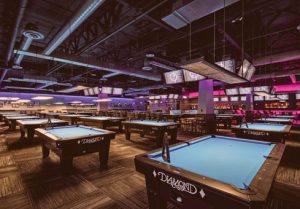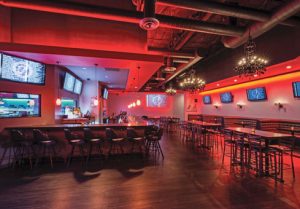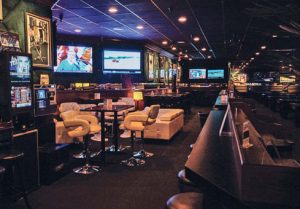Go Big Or Go Home
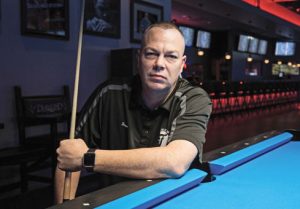
Frost, who opened Freezer’s Ice House in Tempe, Ariz., says most poolroom owners are “simply behind the times.”
While poolrooms struggle across the country, two industry veterans open sparkling new rooms in the Southwest U.S., with hopes of changing the public’s perception of the game. Ask anyone in the industry how to fix pool or how to save pool or what to do to re-energize pool, and you better not have a dinner reservation in 15 minutes. That one question can elicit a wide range of answers. All it needs is another “Color of Money”… We gotta get kids playing pool instead of video games… The big companies and leagues need to work together to promote the game… These proposals, individually, are not wrong — but they are far from short-term, practical fixes. One person isn’t going to get junior leagues up and running across the country. A slick advertising campaign isn’t going to create millions of new players. Any comprehensive solution will have to gain traction at a grassroots level. Changing perceptions of the game will require widespread effort, in addition to any a top-down solutions. Two new poolrooms — Scott Frost’s Freezer’s Ice House in Tempe, Arizona, and Mark Griffin’s eponymous Griff’s in Las Vegas — are aiming to support those already bitten by the pool bug, while also attracting those adjacent to players and fans. These sprawling spots — Frost’s is 15,000 square feet; Griffin’s is 8,300 — are hoping to improve pool’s image by attracting players and a casual crowd who may just want a beer, a burger and a place to watch the game.
Taking Another Swing
Mark Griffin has done just about everything you can do in the pool world — he’s been a table mechanic, room operator, player, instructor, league operator and tournament promoter. The 70-year-old Alaskan native made his biggest play in 2004, when he sold his room in Anchorage, Alaska, and purchased the BCA Pool Leagues. Relocating to Las Vegas, he went full bore into promoting amateur participation and promoting the BCAPL’s annual pilgrimage to Sin City for the league’s championships. Griffin, a tireless advocate for the game, was neck-deep in the amateur side of the game, while also promoting professional events alongside the BCAPL National Championships. He has organized events under his CueSports International brand, including the U.S. Bar Table Championships, the U.S. Open 8-Ball and U.S. Open 10-Ball Championships, and other West Coast events like the Jay Swanson 9-Ball Memorial tournament. Griffin was also a longtime partner in Diamond Billiard Products, owning the tablemaker’s first building in Tennessee, though that business relationship has recently ended. Never one to sit idle, Griffin faced his most troubling opponent in 2014 — news that he would require a lung transplant. Undergoing the procedure in January 2015, that year was dedicated to his recovery — though one eye remained on his pool projects. “Finally, by the end of the year, I started feeling better. I had my health back,” Griffin said. “And it was just about then that the opportunity to buy the room came about. I thought, ‘Why not?’ I thought I’d take a swing at it.”
Going Off the Road
Scott Frost has spent plenty of time on the road. The 42-year-old has scrambled across the United States for the better part of 15 years. One of the best one-pocket players in the world, he put together an impressive resume — collecting major titles including the U.S. Open One-Pocket Championship, Derby City Classic One-Pocket division and the Legends of One-Pocket title. Having beat Efren Reyes a few times, Frost found it harder to find an action game to his liking. In 2007, he started working in a Phoenix poolhall. Officially the house pro, he spent years learning the business — he wasn’t just there to hit balls and attract in hardcore players and fans. “That was kind of an internship for me,” Frost said. “I did everything there — building the leagues, promoting the room, being the face of the business.” After that business partnership ended in 2015, Frost was left without a motivating force. Burned out after that much time on the road, he started thinking about longer term ways to support himself — while fulfilling a personal promise to his family. “My mother and father were both in business,” he said. “When I found pool when I was 16, they were not thrilled. But about three years later, when I could possibly make a living, they really got behind me. I always promised I would never be a broke, degenerate pool player. “That’s a touchy situation because a lot of my heroes and idols — a lot of those guys showed me what to do and what not to do. I always had it in the back of my mind: someday I was going to figure out a way to build my dream poolroom and make it a success.” Without a room to call his own, Frost called up an old friend, Jason Chance, from Des Moines, Iowa. Chance, a strong player in his own right, purchased his father’s business in 2000, turning Diamond Oil from a steady, if unspectacular, business into a 14-location company on the up. “He’s done so much for me already,” Frost said. “I called him up with my idea — and he said I should start scouting locations.”
A Destination Spot
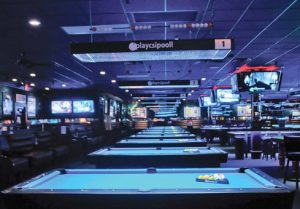
Griff’s features 25 Diamond pool tables and lures players from national tournaments with a shuttle service.
Back on his feet by the end of 2015, Griffin began construction on the room early the next year. Formerly Pool Sharks, the building needed a complete rehab. Walls needed to be replaced. Flooring had to be ripped up and redone. This wasn’t a matter of slapping on a fresh coat of paint and hanging a new shingle out front. “Really, I don’t know how it stayed open with the health department,” he said. “Everything we have is brand new, besides the ceiling grid. We had to expand the kitchen, replace the air-conditioning units. The bathrooms — you could take those and drop them in the Bellagio and nobody would notice.” Located in a 55,000-square-foot mall on four acres, Griff’s is roughly two miles west of the north end of the Vegas Strip. It has 25 Diamond tables — 17 7-footers and eight 9-footers — in addition to a Chinese 8-ball table and a three-cushion table. Investing nearly $1 million in the project, Griffin sees his room, which opened Oct. 31, 2016, as a standard bearer for the game. “I just want pool to have the facilities that will let people see the game how it’s supposed to be,” he said “It’s a gentleman’s game — treat it like that. There’s no woofing and screaming from across the room. It’s a comfortable, classy place.” “We have security at the door. Heck, the guy’s 75 years old, but he’s here because he knows everyone. He was the doorman at Pool Sharks for years. We haven’t had those issues because people act accordingly.” With Las Vegas hosting so many amateur league championships, Griff’s will certainly be a destination for a certain set of tourists. Along those lines, the poolroom runs a 15-person shuttle back and forth to the various tournament hotels. But Griffin knows steady business is found in developing local and regional followings. “We are definitely catering to the local players and even Arizona players,” he said. “We have weekly tournaments, TAP leagues, APA leagues and independent leagues [in addition to BCAPL and USAPL].” But ask any poolroom owner and he will tell you pool and alcohol won’t keep the lights on by themselves. Griff’s put that expanded kitchen to work and offers full bar service. Other promotions, like karaoke contests, hope to catch attention of those who don’t tote a cue case. The room is also one of the only venues in Las Vegas to be completely smoke-free. (Considering Griffin’s recent medical history, one can see why it’s targeting the non-smoking demographic.) “I want to be a place people will visit because there’s no smoking,” he said. “That is a big deal — and I have people come up to me all the time to say thanks. We have one regular [customer] who is a heavy smoker, but he loves it because the place is nicer.” Due to some licensing issues, Griff’s doesn’t yet have video gaming, but Griffin expects to offer the machines that are ubiquitous in town to his patrons. “You can’t survive in this town without them,” he said. “The grocery stores have them. But we’ll hopefully take care of that in the next few months.” While gambling might be part of the culture in Las Vegas, Griffin feels like he’s already won. With his health and plenty of energy, he’s back being an advocate for the game — though vacations might be more plentiful moving forward. “I’m lucky to be alive, that’s the way I look at it. I shouldn’t be here,” he said. “I’m going to work hard but I also want to travel and enjoy myself.”
A Desert Hot Spot
Frost didn’t waste time when he got the go-ahead from Chance to scout for possible locations for a room in 2016. He visited more than a dozen potential sites in the Phoenix area, eventually setting his sights on a freestanding building at the corner of a bustling intersection in Tempe, Arizona. Just a few blocks south of the Arizona State University campus, the spot promised plenty of drive-by traffic, along with the interior space to build a multi-faceted room with pool tables, a lounge/nightclub area and a bar and grill. But wanting and having are two different things. “People ask what was the most stressful part of this whole project,” Frost said. “Far and away, it was negotiating the property.” Bidding against a local organic grocer, Frost spent three months in discussions with the owner before his bid was accepted.
“It was a lot. One week we thought we had it — the next, we weren’t sure,” he said. “The owner really bought into our concept and what we wanted to do with the place. Once we got that deal, it felt like we were gathering momentum.” Construction began in December 2016, with major renovations to what had been a retail space. Throughout the building process, Frost was onsite as much as possible, working with contractors to ensure the reality matched his vision. “It seemed like a million years because I was coming in everyday wanting to go, go, go,” he said. “But really, in what was accomplished in that time, it’s amazing now that I can look back on it.” Six months later, in late June, with a total investment north of $2 million, Freezer’s Ice House opened with 35 Diamond tables, 12 dartboards and more than 100 TVs. Appropriately enough, the Ice House has three different rooms. In addition to the poolroom, the Hot Spot Lounge is a sports bar during the day that turns into a nightclub later in the evenings. 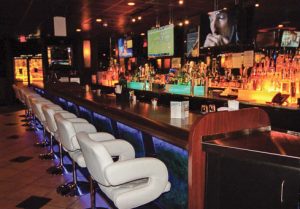 The Chill Grill is a third area that offers quieter drinks and dining. Like Griff’s play to attract non-pool players, the Ice House is more than chalk and stale beer. “You have to give people a reason to come,” Frost said. “I wanted a place that could have families come in. The dad can play pool, mom can have a glass of wine in the lounge and the kids can play Ms. Pac-man.” Also, like Griffin did with his room, Frost sees the Ice House as a contradiction to the tired stereotype of a dirty poolroom. “I do not say ‘poolhall,'” he said. “There’s a stigma there and I don’t want to be a part of it. This is an upscale poolroom. My partner and I, we want to change the face of pool. This is something that is needed, and it’s wanted by a lot of people.”
The Chill Grill is a third area that offers quieter drinks and dining. Like Griff’s play to attract non-pool players, the Ice House is more than chalk and stale beer. “You have to give people a reason to come,” Frost said. “I wanted a place that could have families come in. The dad can play pool, mom can have a glass of wine in the lounge and the kids can play Ms. Pac-man.” Also, like Griffin did with his room, Frost sees the Ice House as a contradiction to the tired stereotype of a dirty poolroom. “I do not say ‘poolhall,'” he said. “There’s a stigma there and I don’t want to be a part of it. This is an upscale poolroom. My partner and I, we want to change the face of pool. This is something that is needed, and it’s wanted by a lot of people.”
Doing Things Differently
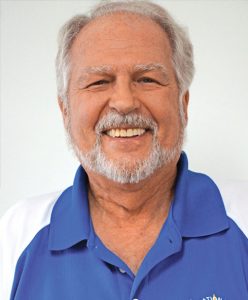 These two rooms are aberrations in an industry that has seen rooms go out of business across the country. So, begs the question, just what makes these guys the ones to be successful in a tight market? Griffin has a simple answer. “I’ve done this before,” he said. “I had the Anchorage Billiard Palace for 16 years.” (He also owned a handful of rooms in San Diego in that time.) Frost, meanwhile, believes his time on the road, along with the years spent working in a Phoenix room, primed him to do it the right way. “I’ve got so many memories and I’ll never regret it,” he said. “But in my opinion, 90 percent of rooms are behind the times. Everybody’s saying the game is dead. Pool isn’t dead. The poolrooms people play in are.”
These two rooms are aberrations in an industry that has seen rooms go out of business across the country. So, begs the question, just what makes these guys the ones to be successful in a tight market? Griffin has a simple answer. “I’ve done this before,” he said. “I had the Anchorage Billiard Palace for 16 years.” (He also owned a handful of rooms in San Diego in that time.) Frost, meanwhile, believes his time on the road, along with the years spent working in a Phoenix room, primed him to do it the right way. “I’ve got so many memories and I’ll never regret it,” he said. “But in my opinion, 90 percent of rooms are behind the times. Everybody’s saying the game is dead. Pool isn’t dead. The poolrooms people play in are.”
Griffin Purchases BCA League System
Mark Griffin, a poolroom owner and partner in table manufacturer Diamond Billiard Products, has agreed to purchase the Billiard Congress of America’s 60,000-player amateur league system, despite the efforts of a group of regional league officials to form their own association in opposition to the sale.
The BCA’s board of directors agreed to the general terms of the deal during a meeting on March 31, the first day of the BCA’s annual industry trade show in Las Vegas. Griffin, a BCA board member who was recused from league-sale votes, made a substantial payment toward the total purchase on April 1.
Griffin was quick to quell fears that he would substantially alter the way the 26-year-old league system operates.
“Nothing will change,” said Griffin, 57, himself a master-level player in the league. “Not the entry fees, or the rules, the regulations, the sanctioning of the teams — there will be no changes.”
For at least the first couple years, the league would maintain the “BCA” name in its moniker, Griffin said. He expected to hire a new administrative staff for the league, the headquarters of which likely would move from Colorado Springs, Colo., to Las Vegas.
[Griffin has created a Web site for those interested in more information on his plans: www.bcapoolleague.com]
The BCA had received multiple offers for the league system, according to John Stransky, chair of the BCA’s league sale committee. Griffin’s bid was considered the strongest overall, in part because “he was very much in favor of keeping things intact,” Stransky said. “BCA players could continue to play under his ownership and expect things to be greatly the same.”
Griffin’s agreement with the BCA came less than a week after news that a group of BCA league operators and state association presidents had decided to form a new association in opposition to the pending sale.
By forming its own league, dubbed the American Cuesports Alliance, the group sought to preserve the BCA system’s not-for-profit modus operandi. Alliance members expected to have the support of a majority of BCA league operators and players, and announced their intention to hold their own national championship in 2005.
[The Web site for the American Cuesports Alliance can be found at www.americancuesports.org]
W.C. Dixon, president of the BCA league’s Texas state association and vice-president of the Alliance, told BD on April 1 that Griffin’s purchase of the league system would have no bearing on the Alliance’s plans.
It all pointed to a war for the hearts and minds of the rank-and-file players at the 2004 BCA National 8-Ball Championships, to be held in mid-May in Las Vegas. Stransky said the BCA would make overtures to players and operators at the event supporting Griffin’s leadership.
For in-depth coverage of the BCA league sale and its ramifications for players, see the May issue of Billiards Digest, mailed to subscribers in mid-April.

